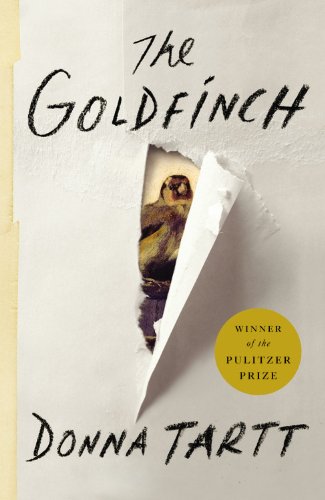[amazon_link id=”0316055433″ target=”_blank” container=”” container_class=”” ] [/amazon_link]Title : The Goldfinch
[/amazon_link]Title : The Goldfinch
Author : Donna Tartt
Genre : Contemporary
Narrators : David Pittu
Publisher : Hachette Audio
Listening Length : 32 hours 24 minutes
Source : Library
Rating : 4/5
The Goldfinch in print is 775 pages long. In audiobook form this comes in at a whopping 32 hours! The longest audiobook I’ve listened to before this is Rohinton Mistry’s A Fine Balance which was a long 24 hours, although so finely written that one didn’t quite notice the hours slip by. I listen to these audiobooks on my phone, and a 24 hour long audiobook is pretty large sized; my trusty little Samsung would take a minute or two just to start and stop the audio reading – so it’s not something I did thoughtlessly 🙂 . When I noticed the length of the Goldfinch, I shuddered to think of my poor phone struggling with the file size. Regardless I went ahead – because what’s a minute or two of load time when listening to a thing of beauty. Because thing of beauty it is – a long, long deliciously wrought and painstakingly explained thing of beauty.
Theodore Decker is our hero, and he’s only a boy of 13 at the beginning of this novel. When a tragedy leaves him an orphan he floats from one home to another, surviving childhood to grow up into an almost respectable member of society. However the mistakes of his youth have followed him into present day, demanding a high price.
That’s the nub of it really and the center of it all – Theo Decker’s rather colorfully varied life. Theo himself is not an unlikeable character. For a lot of the novel, he is a figure to be pitied, an orphan at the mercy of other adults. He is also the underdog as we see him struggle and sometimes succumb to situational pitfalls. But then there’s this other side to him, a desperate side hungering to fill the hole inside of him, not to picky about the means he chooses to fulfill this need.
I like Theo because Tartt sketches him so well, well-meaning but weak, striving to do the right thing, but getting side-tracked along the way; life is such a slippery slope. In my mind’s eye, Theo is a real person, so well has he been sketched. And not just him, the entire novel is proof of Tartt’s firm hold on her subject and story-line. She writes with such surety; her characters are rock-solid. You could come at them 10 different ways and they wouldn’t budge because they are who they are. We know them so well, that when they act, we just nod and go along with the flow.
As good as it was, I do think this tome of a book could have used some editing. In many places Tartt seems to go on and on, describing fairly esoteric experiences like Theo’s drug proclivities or descriptions of places and people. Normally I love description – a fulsome description helps the emotion sink in – but there has to be a balance and this book did not have it. If I had been reading these passages, my eyes would have glazed over. Since I was not reading but listening to it, I tended to drift off and lose the flow, only alighting back on earth when her ethereal description seemed to come back to the present point in the story. Not quite ideal – this drifting off, but there you have it.
The narrator David Pittu is exceptional. Consider that there are quite a few characters in this novel – Theo, his mother, the Barbour family, Theo’s friend Boris, furniture maker Hobart, and Theo’s lady loves – and Pittu gives each one an almost unique voice and style of speaking. Quite amazingly done!
Despite it’s length, this still remains a remarkable book. Recommended for people with the patience gene.

